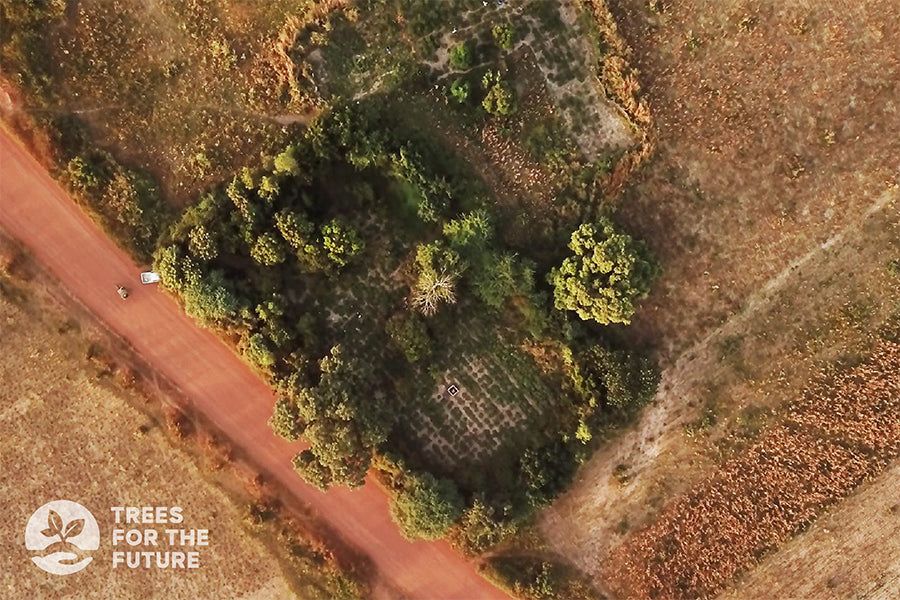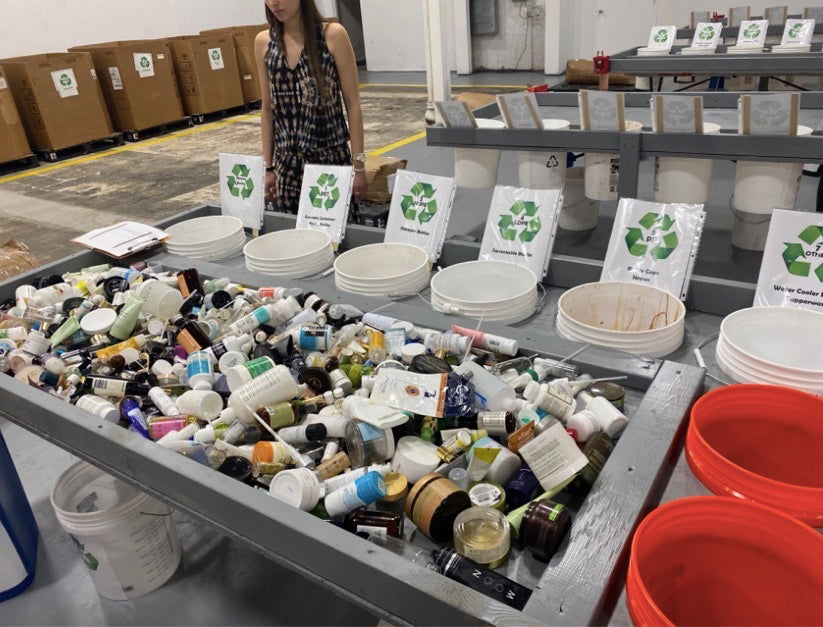Earth Month Conversation with Apoterra's Founder
Happy Earth Month!
If you've been around for a while, you have probably learned that sustainability is one of our core values as a brand. At Apoterra, we seek to live in reciprocity with the planet and minimize harm wherever possible across our sourcing, production, and packaging process. That said, it is a lifelong process that will never be perfectly achieved, so we need to continue reassessing and improving our impact as a company. But where did it all begin, and what is the current state of our sustainability initiatives? We had a chat with our founder Dominique Caron—let's get into it!

Q: What inspired you to start Apoterra and lead with sustainability as a core value?
A: Sustainability has always been something important to me—I think taking care of our environment and the planet is so important for our health, but also our future. I also believe that striving to live in reciprocity with nature is a beautiful and compassionate way to live.
When I was in my early 20s, I found it really difficult to find products that were effective for my sensitive, dry, breakout-prone skin. Beyond that, I found it nearly impossible to find products sourced and packaged with sustainability in mind. That was my motivation behind creating Apoterra—I wanted to create a skincare brand that was not just effective, but created with reciprocity and sustainability in mind, from ingredient sourcing & processing, to packaging and shipping. That is why the company is called “Apoterra,” which means “from the earth.”
Q: What are the main threats that the skincare industry poses to the environment?
A: So many! Tracking the impact of the skincare industry can be pretty complex because skincare products are made using so many different ingredients, and there is so much variety in packaging design. We have a pretty minimalist line and yet we source over 100 ingredients and have about a dozen different types of packaging for our products.
When it comes to sourcing ingredients, the threat is how it may impact the environment from which the ingredient or raw material is sourced. Things like farming practices, deforestation and mining are all at play here. The production process can also have an impact depending on how energy intensive or toxic the process is.
For packaging, the biggest impact is the disposal and lack of recycling/reuse of the packaging. Globally the skincare industry makes about 120 BILLION packages every year (source: Pact Collective) and most isn’t recycled.

Q: Considering these issues, what measures does Apoterra take to minimize environmental harm and support the planet?
A: To reduce harmful impact, you have to reduce, reuse, and then consider recycling. We aren’t perfect, but we currently make these efforts:
- We vet our ingredients and our suppliers & producers as much as is possible to eliminate possible unsustainable or harmful sources. This process can be pretty opaque so we can’t offer a guarantee, but we do as much research as possible and order organic, fair trade when possible, and always cruelty-free.
- A new initiative we are doing relating to sourcing is prioritizing upcycled ingredients. These ingredients help minimize waste which is a great!
- We use PCR (Post-Consumer Recycled) materials as much as possible, and package in glass.
- We don’t offer single use products or package in hard to recycle multi-material packaging (except for our closures, which we do not have any reasonable alternative for at the moment).
- We ship using biodegradable & paper materials (no plastic!)
- We subsidize recycling our hard to recycle packaging (like closures) through Pact Collective.
- We plant 1 tree for every product that is purchased.
- To reduce harmful impact, you have to reduce, reuse, and then consider recycling.
We aren’t currently doing these things, but I hope we can implement these initiatives in the next few years:
- Reduce by launching a refill program with either “package-less” or recycled aluminum refills.
- Reuse by having closures made from PCR.

Q: You mentioned upcycled ingredients—can you share more about what these are and why they are important?
A: I’m really excited about these! The definition of Upcycled is “(of discarded objects or material) reused in such a way as to create a product of higher quality or value than the original” (source). Think used coffee grounds that are sterilized and used in a body scrub - but there are much more sophisticated types of upcycled ingredients!
Reducing and reusing are the first two steps in reducing our environmental footprint. Choosing upcycled ingredients helps both reduce waste and reuse ingredients that would normally be discarded as trash.
Currently we use passionfruit seed oil, which is made from seeds that are discarded from the passion fruit industry. We are currently looking to integrate a lot more into the line—such as a preservative made from discarded banana peels, a hydration complex produced from discarded fermented grain from a distillery, and other upcycled fruit seed oils.
Q: How are customers making a difference by choosing sustainably-minded brands like Apoterra?
A: I know that most people will choose skincare for its effectiveness over any other reason. That is why I make effectiveness the #1 priority with our formulations. My hope is that by making effective skincare that is also sustainably minded, we make it easier for people to live more sustainable lives through personal care choices. By supporting us, you are planting trees but you are also supporting organic agriculture, supporting fair trade practices, supporting upcycled ingredient manufacturers—because that is who we support through our sourcing, spending, and donations.
By shopping with us, we also make disposing of your packaging properly easier. For packaging to be sustainable, it needs to be recyclable but also recycled. Glass that ends up in the landfill is not sustainable (and actually has a larger carbon footprint than plastic!). To be sustainable, the packaging must be properly disposed of—which is why we subsidize recycling through our Pact program. :)
Psst—you get 15% off your next purchase when you recycle ANY brand packaging through this program!

Q: What sustainability goals has Apoterra met in recent years, and what’s on the horizon?
A: As a company, since we started super small (AKA me in a studio apartment), we didn’t measure our impact or have specific goals in mind besides “being eco-friendly.” But that is changing. I’m proud to say we have kept 20k+ plastic bottles and plastic bubble wrap sheets from ending up in the landfill by choosing glass and paper padding instead. We recently set goals of becoming carbon and plastic negative by 2025, and to increase the % of our ingredients that come from upcycled sources to 20%.
Also, since launching our tree planting program in partnership with TREES, Apoterra & our customers have collectively planted over 80,000 trees! I think sometimes planting trees feels a bit outdated (a la “90s eco”), but I truly believe this is still one of the best ways to combat climate change. Did you know that 1 tree absorbs 48 pounds of carbon dioxide a year, produces enough oxygen for 2 people, they reduce erosion, recharge ground water, help the soil stay healthy through nitrogen fixation and help lower air temperatures?
Q: What are some unique challenges that consumers may face with sustainability in skincare products?
A: Recycling is SO complicated. If something is recyclable, it doesn’t necessarily mean it will be recycled by your local MRF (Materials Recovery Facility) even if you put the packaging in your recycling bin. What determines if something will be recycled is your local MRF recycling capacity, how complicated the packaging is to recycle (is it made from a single material, or multiple), and the market demand for that material.
A first good step is to familiarize yourself with plastics (1, 2, 3, etc) and your local MRF recycling guidelines. For materials that aren’t recyclable with your local MRF, we recommend recycling through Pact Collective.
Q: Can you share any inspiring news or discoveries you have learned about sustainability in the skincare industry?

A: When I launched Apoterra in 2012, people in general and public discourse were either not all that interested or not very informed about the sustainability of skincare ingredients and packaging. Today it is much more important to consumers, and consumers are much more educated! I think even in the industry as a whole, there is more cooperation and sharing of knowledge, and we are all learning to do better together.
I think people now see that the solution is not one product, or one person, but has to be collective action that considers the whole cycle from how the ingredients are grown and produced, to what happens to the packaging once it enters recycling or landfill streams. And we can only improve that cycle by working together. There is also this acknowledgement that you can’t be perfect—the important thing is to try and keep improving.
I was very excited about the launch of Pact in 2021 (Apoterra was an inaugural member). Pact is a non-profit collective of beauty industry members, driving the industry towards systemic change to make beauty and wellness packaging more sustainable, containing more recycled content, and that can be truly recycled. They also focus on education and sharing of usually privately held knowledge. In 2022, they collected over 156k lbs of material, and were able to recycle 77% (the remaining material processing is TBD based on volumes collected and highest and best use hierarchy—it could still get recycled).
Q: If someone wanted to incorporate more sustainably-minded practices into their skincare, what are your top 3 sensible Earth Month takeaways?
A: To reduce harmful impact, it's best to first reduce, reuse, and then consider recycling. With this in mind, here are 3 easy tips:
Reduce: Minimize your routine and your "shelfie." If you use all the products, that’s fine! But if half end up expiring before you use them up, consider purchasing less and/or giving products you don’t use as much to friends and family.
Reuse: Try to reuse your packaging. I like using our jars for storing knickknacks, and use our spray bottles to make DIY room mists (water & essential oils is all you need!).
Recycle: Familiarize yourself with your local MRF recycling capabilities. Then, when possible, choose skincare packaged in easily recyclable packaging, or packaging made from PCW materials. When you can't recycle it curbside, recycle with Pact to save the planet (and get that cool 15% off!)
Thank you for supporting Apoterra! We hope you're inspired to save the planet and get that glow at the same time. Let's all take a moment to be grateful for our wonderful planet this Earth month, and strive to be part of the change!




